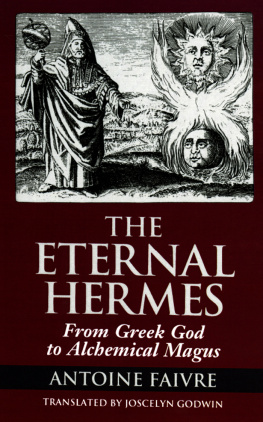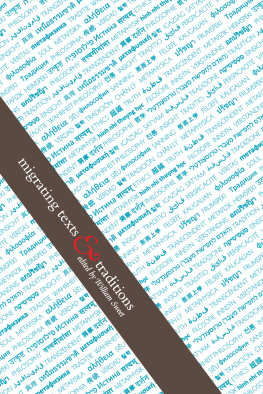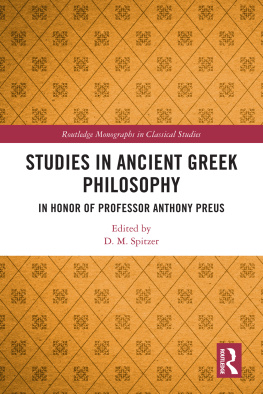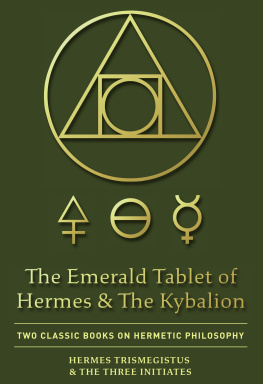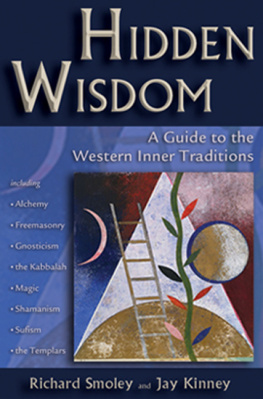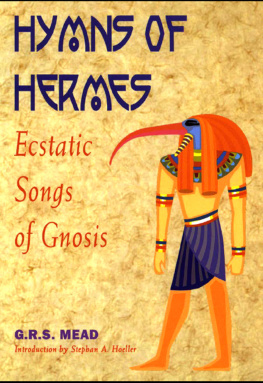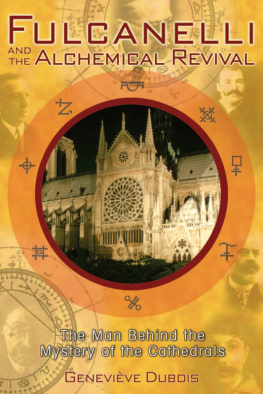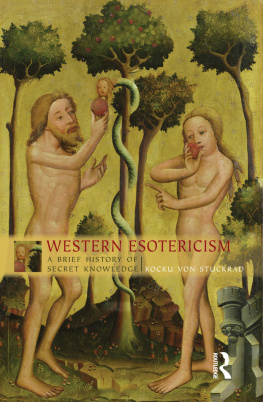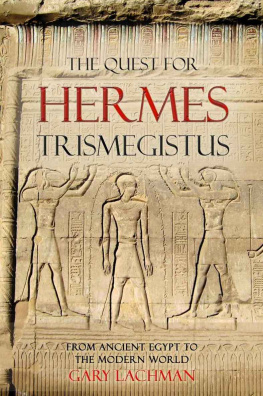By the same author
Les Vampires (Essai historique, critique et littraire)
Paris: Le Terrain Vague, 1962
Kirchberger et l'Illuminisme du dix-huitime sicle
The Hague: Martinus Nijhoff, 1966
Eckartshausen et la thosophie chrtienne
Paris: Klincksieck, 1969
L'Esotrisme au XVIII sicle en France et en Allemagne
Paris: Seghers-Laffont, 1973
Mystiques, thosophes et Illumins au sicle des Lumires
Hildesheim: G. Olms, 1977
Les Contes de Grimm (Mythe et Initiation)
Paris: Les Lettres Modernes, 1978
Access to Western Esotericism
Albany: State University of New York Press, 1994
The Golden Fleece and Alchemy
Albany: State University of New York Press, 1993
Philosophie de la Nature (Physique SacreThosophie)
Paris: Albin Michel, 1995
THE
ETERNAL
HERMES
From Greek God
to Alchemical Magus
With thirty-nine plates
Antoine Faivre
Translated by
Joscelyn Godwin
PHANES PRESS
1995 by Antoine Faivre. All rights reserved. No part of this publication may be reproduced or transmitted in any form, with the exception of short excerpts used in reviews, without permission in writing from the publisher.
Book and cover design by David Fideler.
Phanes Press publishes many fine books on the philosophical, spiritual, and cosmological traditions of the Western world. To receive a complete catalogue, please write:
Phanes Press, PO Box 6114, Grand Rapids, MI 49516, USA.
Library of Congress Cataloging-in-Publication Data
Faivre, Antoine, 1934
The eternal Hermes : from Greek god to alchemical magus / Antoine Faivre ; translated by Joscelyn Godwin
p. cm.
Articles originally in French, published separately.
Includes bibliographical references and index.
ISBN 0-933999-53-4 (alk. paper)ISBN 0-933999-52-6
(pbk. : alk. paper)
1. Hermes (Greek deity) 2. Hermes, Trismegistus. 3. HermetismHistory. 4. AlchemyHistory. I. Title
BL920.M5F35 1995
135 .4dc20 95-3854
CIP
Printed on permanent, acid-free paper.
Printed in the United States of America.
For Lionel Robbe-Jedeau
PREFACE
The title of this collection encompasses two figures who are both distinct and complementary: Hermes-Mercuri us, the God with the caduceus, who belongs to Greek and Roman mythology, and Hermes Trismegistus, whose appearance can be traced back to the early Alexan dian epoch. Each of the six chapters stands on its own, having been published separately, and deals either with the God Hermes, or with Hermes Trismegistusor with both. Given the similar inspiration running through all six essays, David Fideler and Joscelyn Godwin suggested that they might constitute an anthology endowed with some homogeneity. Therefore, for the purpose of the present edition, the articles in this volume have been for the most part corrected and enlarged, and their inevitable overlappings have been reduced. In their original version, they were published as follows:
: Herms, in Dictionnaire des mythes littraires, ed. Pierre Brunel (Paris: Editions du Rocher, 1988), pp. 705-732.
: The Children of Hermes and the Science of Man, published in English in Hermeticism in the Renaissance (Intellectual History and the Occult in Early Moder Europe), ed. Ingrid Merkel and Allen G. Debus (Washington: The Folger Shakespeare Library; London and Toronto: Associated Presses, 1988), pp.24-48. From Symposium held in March, 1982, at thelnstitute for Renaissance and Eighteenth Century Studies in the Folger Shakespeare Library, Washington, D.C.
: D'Herms-Mercure Herms Trismgiste: au confluent du mythe et du mythique, in Prsence d'Herms Trismgiste, ed. Antoine Faivre and Frdrick Tristan (Paris: Albin Michel, series Cahiers de l'Hermtisme, 1988). From Symposium held in July, 1985, in Cerisy-La-Salle on The Myth and the Mythical.
Cidde, ed. Yvette K. Centeno (Lisbon: Calouste Gulbenkian Foundation, Acardte, 1989), pp.337-349. From Symposium held in October, 1985, in Lisbon on The Imaginary of the Town.
: Visages d'Herms Trismgiste, in Prsence d'HermsTrisrgiste [see above], pp.49-99.
: La postrit de l'hermtisme alexandrin: rperes historiques et bibliographiques, in Prsence d'HermsTrisrgiste [see above], pp.13-23.
I offer my personal thanks to Joscelyn Godwin, not only for translating the entire volume, but also for enriching it with new references. My thanks also goes to David Fideler for his editorial counsel, and to Jean-Pierre Mah for completing my information on some particular aspects of the Hermetica.
ANTOINE FAIVRE
CHAPTER ONE
Hermes in the Western Imagination
Introduction: The Greek Hermes
Just as the daylight penetrates at dawn through every crack and crevice, says the author of the Homeric Hymn, so Hermes slipped silently in through the keyhole of the cavern which gave him birth. How plastic, mobile, and ambiguous is the nature of this god, whose feminine companions are Hermione, Harmonia, and above all Iris, who precedes him with breezy feet and wings of gold! In Greek mythology, Hermes appears as an engaging and complex figure, in forms both mobile and definitive, so that one must first know these myths in order to follow his tracks through the long path of the Western imagination, from the Middle Ages to the present. They are the essential reference, like the omnipresent background of a picture: so familiar, or at least so accessible to us that there is no need here to retell the stories in which Greek Hermes, or Latin Mercury, plays the protagonist, the hero, or a walk-on role. We will just recall some of his characteristics that have been constantly repeated and emphasized from Antiquity to modern times.
Two of these traits stand out from the tangled undergrowth: first, his guiding function, linked to his extreme mobility; second, his mastery of speech and interpretation, warrant of a certain type of knowledge. Virgil, well aware of Mercury's plasticity, describes how the lively messenger of the gods controls wind and clouds with his magic wand, flying through them like a bird. But this traveler does not follow strict or planned itineraries: as Karl Kernyi suggests, he is more of a journeyer than a traveler. Just as the geographical goal of a honeymoon is of little importance, so Mercury wanders about and communicates for the sheer pleasure of it. His route is not the shortest distance between two points: it is a world in itself, made of serpentine paths where chance and the unforeseen may happen. Hermaion means fallen fruit or windfall. To profit from windfalls does not exclude the possibility of giving destiny a slight nudge, through tricks and subterfuges. Thus one sometimes finds Hermes unearthing hidden treasures; and it is only a short step from there to making off with them! Hermes [Hermaion] in common! said the Greeks on making a lucky find, just as one says in English Equal shares all round! In the same spirit, eclecticism is justified-and plagiarism, too; but stealing is not a good rendering of the Greek kleptein, which suggests rather the idea of a ruse, in the sense of a secret action. (Compare the German word Tuschung, and the charming verb verschalken.J And is not hermeneutics all about bringing hidden treasures to light?
Hermes, unlike Prometheus, steals things only in order to put them back into circulation. Thus one could speak of his function as psychopomp as encompassing the circulation of souls. This function is dual, for Hermes is not content merely to lead souls to the kingdom of the dead: he also goes there to find them and bring them back to the land of the living (cf.

